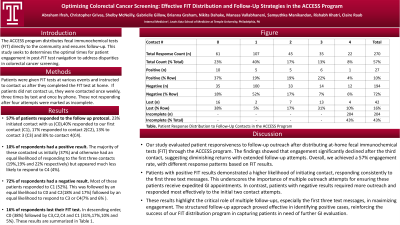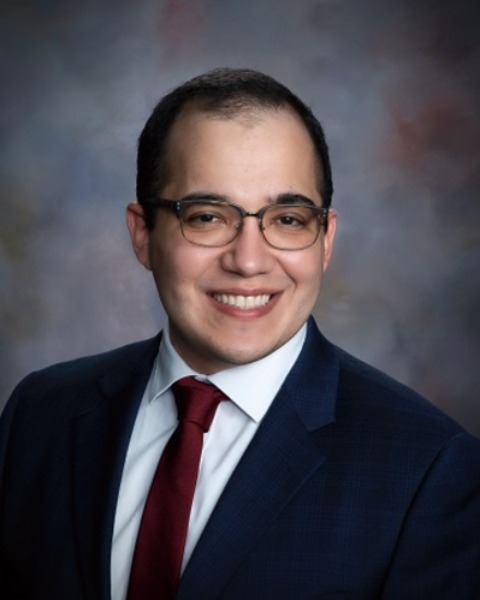Monday Poster Session
Category: Colorectal Cancer Prevention
P2128 - Optimizing Colorectal Cancer Screening: Effective FIT Distribution and Follow-Up Strategies in the ACCESS Program
Monday, October 28, 2024
10:30 AM - 4:00 PM ET
Location: Exhibit Hall E

Has Audio

Abraham A. Ifrah, MD, MS
Temple University Hospital
Philadelphia, PA
Presenting Author(s)
Abraham A. Ifrah, MD, MS1, Christopher Grivas, MD, MBA1, Shelby McNeilly, DO2, Gabrielle Gillow, MD1, Brianna Graham, MD1, Nikita Dahake, MD2, Manasa Vallabhaneni, MD1, Samyuktha Manikandan, MD1, Rishabh Khatri, MD1, Claire Raab, MD3
1Temple University Hospital, Philadelphia, PA; 2Temple University, Philadelphia, PA; 3Temple Health, Philadelphia, PA
Introduction: The ACCESS program distributes fecal immunochemical tests (FIT) directly to the community and ensures follow-up. This study seeks to determine the optimal times for patient engagement in post-FIT test navigation to address disparities in colorectal cancer screening.
Methods: Patients were given FIT tests at various events and instructed to contact us after they completed the FIT test at home. If patients did not contact us, they were contacted once weekly, three times by text and once by phone. Those not responding after four attempts were marked as incomplete.
Results: 57% of patients responded to the follow up protocol. 23% initiated contact with us (C0),40% responded to our first contact (C1), 17% responded to contact 2 (C2), 13% to contact 3 (C3) and 8% to contact 4 (C4).
10% of respondents had a positive result. The majority of these contacted us initially (37%) and otherwise had an equal likelihood of responding to the first three contacts (19%,19% and 22% respectively) but appeared much less likely to respond to C4 (4%).
72% of respondents had a negative result. Most of these patients responded to C1 (52%). This was followed by an equal likelihood to C0 and C2 (18% and 17%) followed by an equal likelihood to respond to C3 or C4 (7% and 6% ).
16% of respondents lost their FIT test. In descending order, C0 (38%) followed by C3,C2,C4 and C1 (31%,17%,10% and 5%). These results are summarized in Table 1.
Discussion: Our study assessed patient responsiveness to follow-up contacts after distributing at-home fecal immunochemical tests (FIT) via the ACCESS program. Responses decreased significantly on the fourth contact attempt, indicating reduced effectiveness of extended follow-up. We observed a 57% engagement rate, with distinct response patterns based on FIT results. Patients with positive results were more likely to initiate contact and responded equally to the first three text messages, highlighting the importance of multiple outreach attempts. Conversely, those with negative results were more likely to require outreach and were most responsive to the initial and second contact attempts. These findings emphasize the importance of multiple contacts and specifically the first three text messages in optimizing engagement, especially for identifying and supporting positive patients and providing them with expedited GI appointments. Distributing FIT tests effectively captures positive results through structured follow-up, demonstrating our program's efficacy in identifying positive cases.
Note: The table for this abstract can be viewed in the ePoster Gallery section of the ACG 2024 ePoster Site or in The American Journal of Gastroenterology's abstract supplement issue, both of which will be available starting October 27, 2024.
Disclosures:
Abraham A. Ifrah, MD, MS1, Christopher Grivas, MD, MBA1, Shelby McNeilly, DO2, Gabrielle Gillow, MD1, Brianna Graham, MD1, Nikita Dahake, MD2, Manasa Vallabhaneni, MD1, Samyuktha Manikandan, MD1, Rishabh Khatri, MD1, Claire Raab, MD3. P2128 - Optimizing Colorectal Cancer Screening: Effective FIT Distribution and Follow-Up Strategies in the ACCESS Program, ACG 2024 Annual Scientific Meeting Abstracts. Philadelphia, PA: American College of Gastroenterology.
1Temple University Hospital, Philadelphia, PA; 2Temple University, Philadelphia, PA; 3Temple Health, Philadelphia, PA
Introduction: The ACCESS program distributes fecal immunochemical tests (FIT) directly to the community and ensures follow-up. This study seeks to determine the optimal times for patient engagement in post-FIT test navigation to address disparities in colorectal cancer screening.
Methods: Patients were given FIT tests at various events and instructed to contact us after they completed the FIT test at home. If patients did not contact us, they were contacted once weekly, three times by text and once by phone. Those not responding after four attempts were marked as incomplete.
Results: 57% of patients responded to the follow up protocol. 23% initiated contact with us (C0),40% responded to our first contact (C1), 17% responded to contact 2 (C2), 13% to contact 3 (C3) and 8% to contact 4 (C4).
10% of respondents had a positive result. The majority of these contacted us initially (37%) and otherwise had an equal likelihood of responding to the first three contacts (19%,19% and 22% respectively) but appeared much less likely to respond to C4 (4%).
72% of respondents had a negative result. Most of these patients responded to C1 (52%). This was followed by an equal likelihood to C0 and C2 (18% and 17%) followed by an equal likelihood to respond to C3 or C4 (7% and 6% ).
16% of respondents lost their FIT test. In descending order, C0 (38%) followed by C3,C2,C4 and C1 (31%,17%,10% and 5%). These results are summarized in Table 1.
Discussion: Our study assessed patient responsiveness to follow-up contacts after distributing at-home fecal immunochemical tests (FIT) via the ACCESS program. Responses decreased significantly on the fourth contact attempt, indicating reduced effectiveness of extended follow-up. We observed a 57% engagement rate, with distinct response patterns based on FIT results. Patients with positive results were more likely to initiate contact and responded equally to the first three text messages, highlighting the importance of multiple outreach attempts. Conversely, those with negative results were more likely to require outreach and were most responsive to the initial and second contact attempts. These findings emphasize the importance of multiple contacts and specifically the first three text messages in optimizing engagement, especially for identifying and supporting positive patients and providing them with expedited GI appointments. Distributing FIT tests effectively captures positive results through structured follow-up, demonstrating our program's efficacy in identifying positive cases.
Note: The table for this abstract can be viewed in the ePoster Gallery section of the ACG 2024 ePoster Site or in The American Journal of Gastroenterology's abstract supplement issue, both of which will be available starting October 27, 2024.
Disclosures:
Abraham Ifrah indicated no relevant financial relationships.
Christopher Grivas indicated no relevant financial relationships.
Shelby McNeilly indicated no relevant financial relationships.
Gabrielle Gillow indicated no relevant financial relationships.
Brianna Graham indicated no relevant financial relationships.
Nikita Dahake indicated no relevant financial relationships.
Manasa Vallabhaneni indicated no relevant financial relationships.
Samyuktha Manikandan indicated no relevant financial relationships.
Rishabh Khatri indicated no relevant financial relationships.
Claire Raab indicated no relevant financial relationships.
Abraham A. Ifrah, MD, MS1, Christopher Grivas, MD, MBA1, Shelby McNeilly, DO2, Gabrielle Gillow, MD1, Brianna Graham, MD1, Nikita Dahake, MD2, Manasa Vallabhaneni, MD1, Samyuktha Manikandan, MD1, Rishabh Khatri, MD1, Claire Raab, MD3. P2128 - Optimizing Colorectal Cancer Screening: Effective FIT Distribution and Follow-Up Strategies in the ACCESS Program, ACG 2024 Annual Scientific Meeting Abstracts. Philadelphia, PA: American College of Gastroenterology.
